Abstract
Ehrlichia risticii is a gram-negative obligate intracellular bacterium which primarily infects macrophages and crypt epithelial cells in the intestinal wall and is the etiologic agent of Potomac horse fever. To understand the pathogenesis of the disease, we tested whether E. risticii induces inflammation-associated products in thioglycolate-induced mouse peritoneal macrophages. Mouse peritoneal macrophages produced larger amounts of interleukin-1 alpha (IL-1 alpha) but lower levels of tumor necrosis factor alpha (TNF-alpha), IL-6, and prostaglandin E2 (PGE2) when exposed to live or killed E. risticii than when exposed to Escherichia coli lipopolysaccharide (LPS). Preincubation of macrophages with live or killed E. risticii suppressed TNF-alpha, IL-6, and PGE2 generation but not IL-1 alpha production in response to LPS. Murine gamma interferon treatment of macrophages did not influence TNF-alpha, IL-1 alpha, IL-6, or PGE2 production regardless of exposure to E. risticii. Intracellular cyclic AMP was significantly greater in E. risticii-infected macrophages than in uninfected macrophages. These results suggest that increased levels of IL-1 alpha but not TNF-alpha or PGE2 production by macrophages may be primarily involved in the pathogenesis of the disease caused by E. risticii. Increased intracellular concentration of cyclic AMP in infected macrophages may be chiefly responsible for the high level of IL-1 alpha and inhibition of TNF-alpha production in response to LPS.
Full text
PDF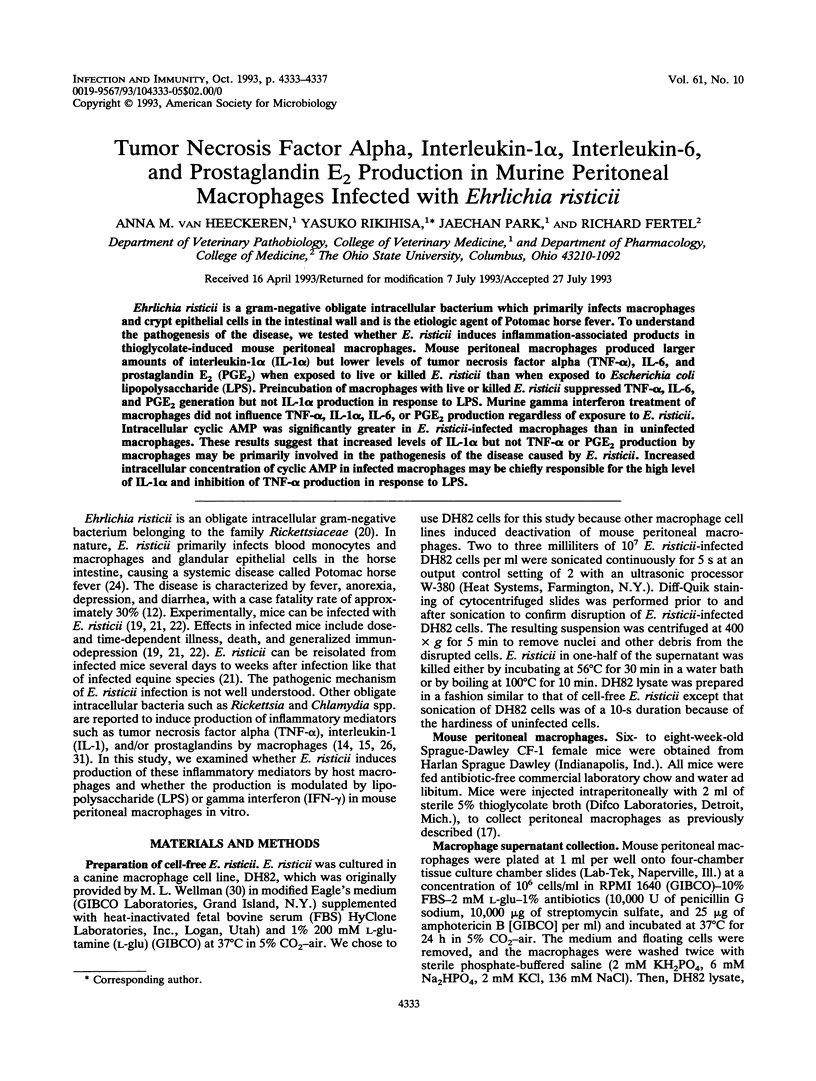
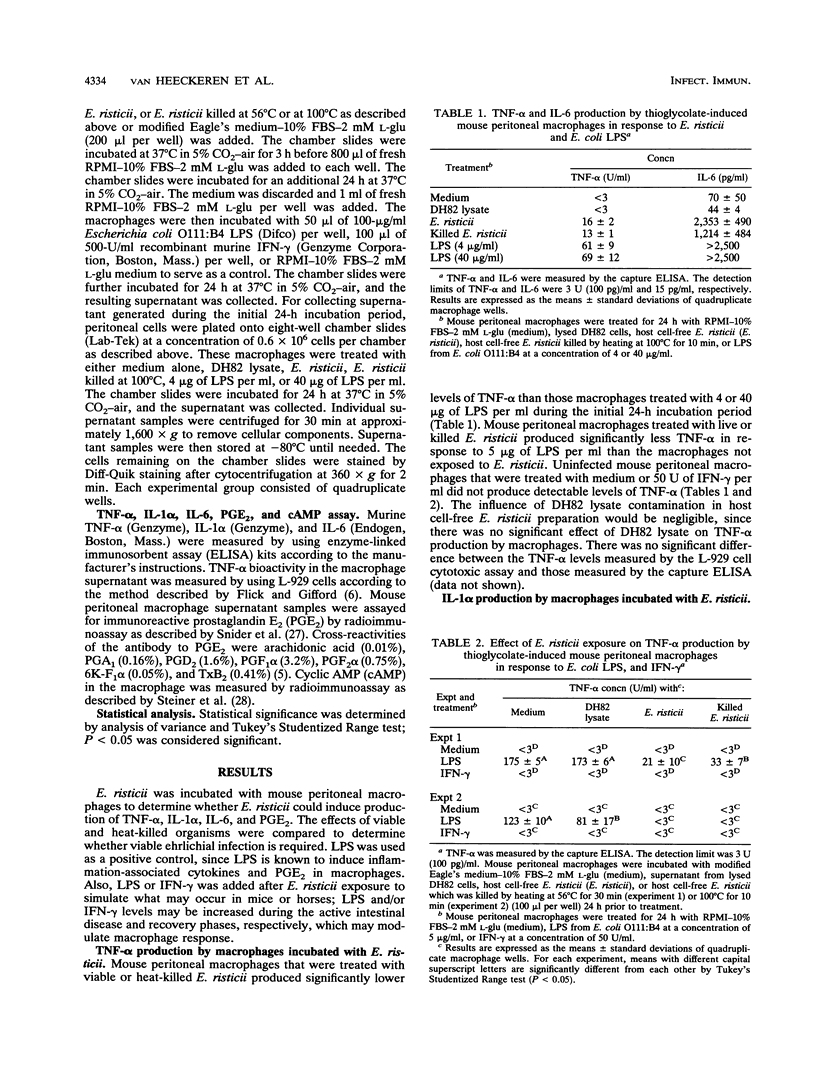
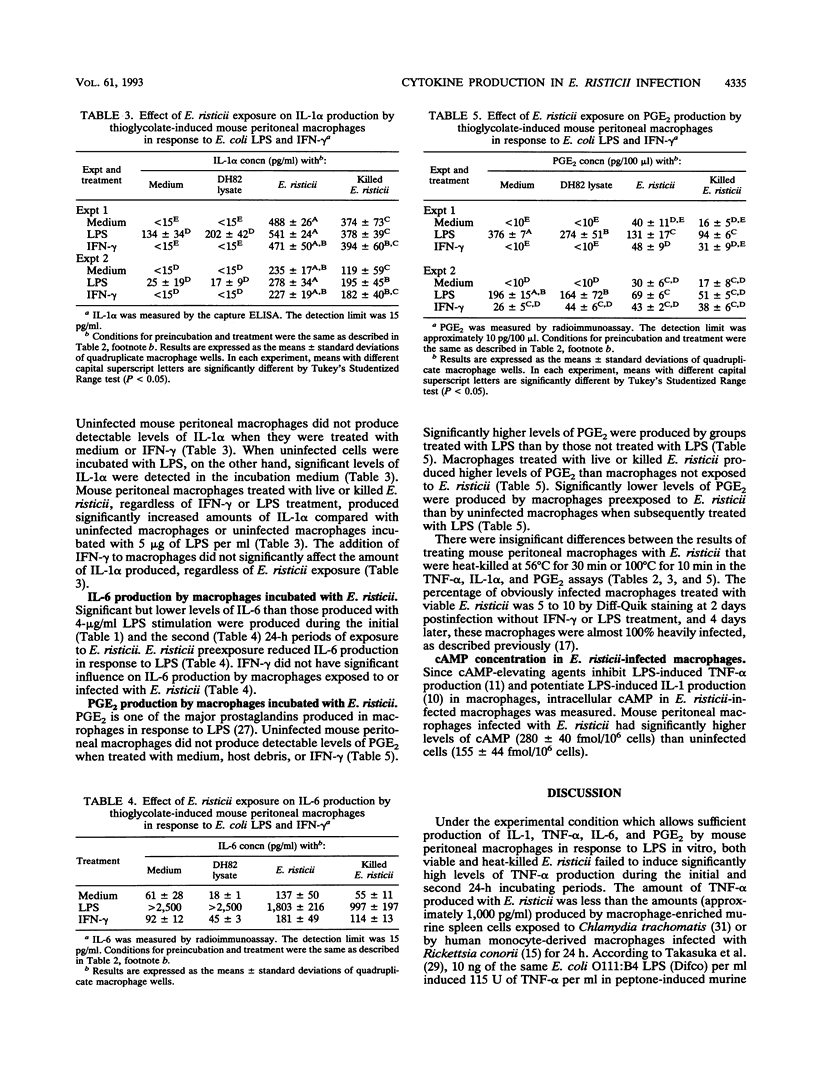
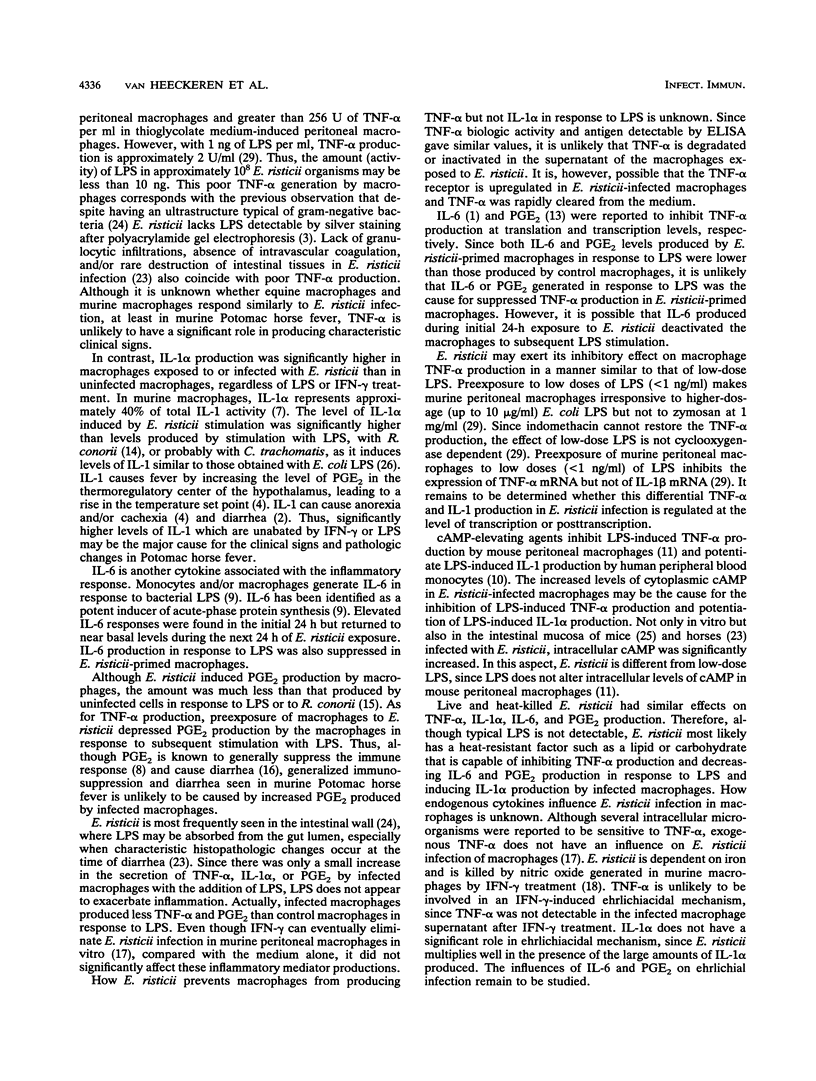
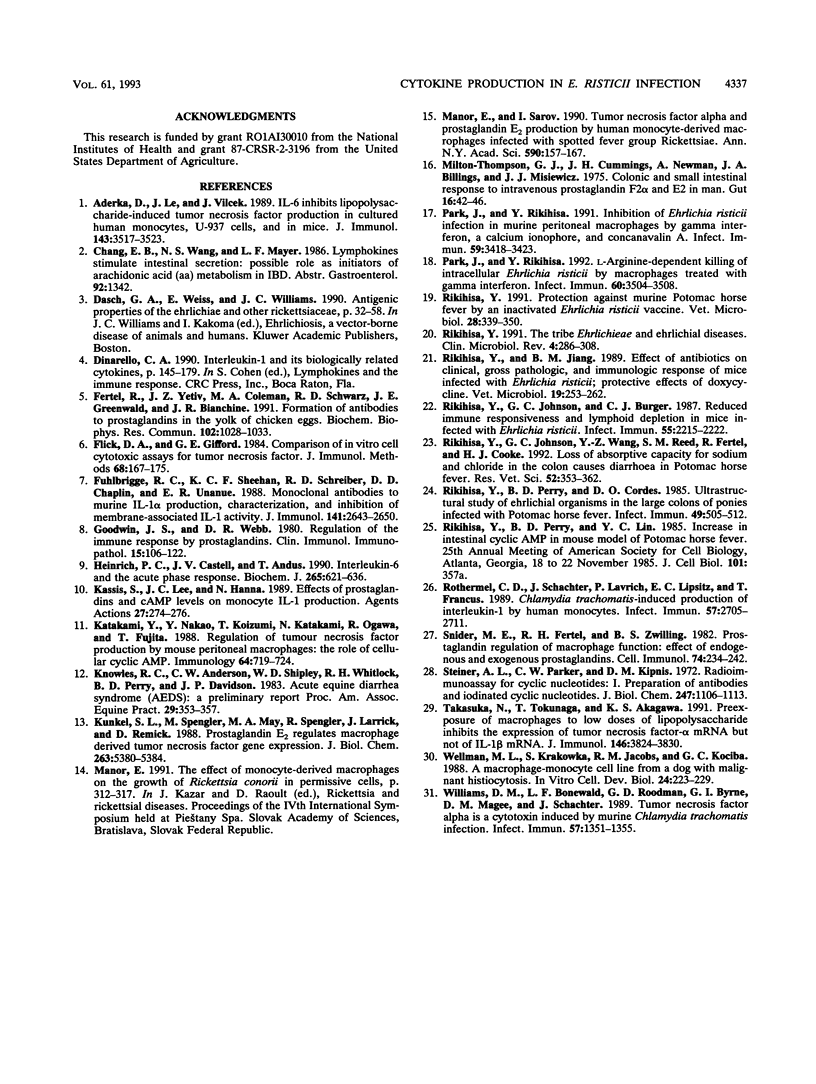
Selected References
These references are in PubMed. This may not be the complete list of references from this article.
- Aderka D., Le J. M., Vilcek J. IL-6 inhibits lipopolysaccharide-induced tumor necrosis factor production in cultured human monocytes, U937 cells, and in mice. J Immunol. 1989 Dec 1;143(11):3517–3523. [PubMed] [Google Scholar]
- Fertel R., Yetiv J. Z., Coleman M. A., Schwarz R. D., Greenwald J. E., Bianchine J. R. Formation of antibodies to prostaglandins in the yolk of chicken eggs. Biochem Biophys Res Commun. 1981 Oct 15;102(3):1028–1033. doi: 10.1016/0006-291x(81)91641-7. [DOI] [PubMed] [Google Scholar]
- Flick D. A., Gifford G. E. Comparison of in vitro cell cytotoxic assays for tumor necrosis factor. J Immunol Methods. 1984 Mar 30;68(1-2):167–175. doi: 10.1016/0022-1759(84)90147-9. [DOI] [PubMed] [Google Scholar]
- Fuhlbrigge R. C., Sheehan K. C., Schreiber R. D., Chaplin D. D., Unanue E. R. Monoclonal antibodies to murine IL-1 alpha. Production, characterization, and inhibition of membrane-associated IL-1 activity. J Immunol. 1988 Oct 15;141(8):2643–2650. [PubMed] [Google Scholar]
- Goodwin J. S., Webb D. R. Regulation of the immune response by prostaglandins. Clin Immunol Immunopathol. 1980 Jan;15(1):106–122. doi: 10.1016/0090-1229(80)90024-0. [DOI] [PubMed] [Google Scholar]
- Heinrich P. C., Castell J. V., Andus T. Interleukin-6 and the acute phase response. Biochem J. 1990 Feb 1;265(3):621–636. doi: 10.1042/bj2650621. [DOI] [PMC free article] [PubMed] [Google Scholar]
- Kassis S., Lee J. C., Hanna N. Effects of prostaglandins and cAMP levels on monocyte IL-1 production. Agents Actions. 1989 Jun;27(3-4):274–276. doi: 10.1007/BF01972795. [DOI] [PubMed] [Google Scholar]
- Katakami Y., Nakao Y., Koizumi T., Katakami N., Ogawa R., Fujita T. Regulation of tumour necrosis factor production by mouse peritoneal macrophages: the role of cellular cyclic AMP. Immunology. 1988 Aug;64(4):719–724. [PMC free article] [PubMed] [Google Scholar]
- Kunkel S. L., Spengler M., May M. A., Spengler R., Larrick J., Remick D. Prostaglandin E2 regulates macrophage-derived tumor necrosis factor gene expression. J Biol Chem. 1988 Apr 15;263(11):5380–5384. [PubMed] [Google Scholar]
- Manor E., Sarov I. Tumor necrosis factor alpha and prostaglandin E2 production by human monocyte-derived macrophages infected with spotted fever group rickettsiae. Ann N Y Acad Sci. 1990;590:157–167. doi: 10.1111/j.1749-6632.1990.tb42218.x. [DOI] [PubMed] [Google Scholar]
- Milton-Thompson G. J., Cummings J. H., Newman A., Billings J. A., Misiewicz J. J. Colonic and small intestinal response to intravenous prostaglandin F2 alpha and E2 in man. Gut. 1975 Jan;16(1):42–46. doi: 10.1136/gut.16.1.42. [DOI] [PMC free article] [PubMed] [Google Scholar]
- Park J., Rikihisa Y. Inhibition of Ehrlichia risticii infection in murine peritoneal macrophages by gamma interferon, a calcium ionophore, and concanavalin A. Infect Immun. 1991 Oct;59(10):3418–3423. doi: 10.1128/iai.59.10.3418-3423.1991. [DOI] [PMC free article] [PubMed] [Google Scholar]
- Park J., Rikihisa Y. L-arginine-dependent killing of intracellular Ehrlichia risticii by macrophages treated with gamma interferon. Infect Immun. 1992 Sep;60(9):3504–3508. doi: 10.1128/iai.60.9.3504-3508.1992. [DOI] [PMC free article] [PubMed] [Google Scholar]
- Rikihisa Y., Jiang B. M. Effect of antibiotics on clinical, pathologic and immunologic responses in murine Potomac horse fever: protective effects of doxycycline. Vet Microbiol. 1989 Mar;19(3):253–262. doi: 10.1016/0378-1135(89)90071-0. [DOI] [PubMed] [Google Scholar]
- Rikihisa Y., Johnson G. C., Burger C. J. Reduced immune responsiveness and lymphoid depletion in mice infected with Ehrlichia risticii. Infect Immun. 1987 Sep;55(9):2215–2222. doi: 10.1128/iai.55.9.2215-2222.1987. [DOI] [PMC free article] [PubMed] [Google Scholar]
- Rikihisa Y., Johnson G. C., Wang Y. Z., Reed S. M., Fertel R., Cooke H. J. Loss of absorptive capacity for sodium and chloride in the colon causes diarrhoea in Potomac horse fever. Res Vet Sci. 1992 May;52(3):353–362. doi: 10.1016/0034-5288(92)90037-3. [DOI] [PubMed] [Google Scholar]
- Rikihisa Y., Perry B. D., Cordes D. O. Ultrastructural study of ehrlichial organisms in the large colons of ponies infected with Potomac horse fever. Infect Immun. 1985 Sep;49(3):505–512. doi: 10.1128/iai.49.3.505-512.1985. [DOI] [PMC free article] [PubMed] [Google Scholar]
- Rikihisa Y. Protection against murine potomac horse fever by an inactivated Ehrlichia risticii vaccine. Vet Microbiol. 1991 May;27(3-4):339–350. doi: 10.1016/0378-1135(91)90159-d. [DOI] [PubMed] [Google Scholar]
- Rikihisa Y. The tribe Ehrlichieae and ehrlichial diseases. Clin Microbiol Rev. 1991 Jul;4(3):286–308. doi: 10.1128/cmr.4.3.286. [DOI] [PMC free article] [PubMed] [Google Scholar]
- Rothermel C. D., Schachter J., Lavrich P., Lipsitz E. C., Francus T. Chlamydia trachomatis-induced production of interleukin-1 by human monocytes. Infect Immun. 1989 Sep;57(9):2705–2711. doi: 10.1128/iai.57.9.2705-2711.1989. [DOI] [PMC free article] [PubMed] [Google Scholar]
- Snider M. E., Fertel R. H., Zwilling B. S. Prostaglandin regulation of macrophage function: effect of endogenous and exogenous prostaglandins. Cell Immunol. 1982 Dec;74(2):234–242. doi: 10.1016/0008-8749(82)90024-7. [DOI] [PubMed] [Google Scholar]
- Steiner A. L., Parker C. W., Kipnis D. M. Radioimmunoassay for cyclic nucleotides. I. Preparation of antibodies and iodinated cyclic nucleotides. J Biol Chem. 1972 Feb 25;247(4):1106–1113. [PubMed] [Google Scholar]
- Takasuka N., Tokunaga T., Akagawa K. S. Preexposure of macrophages to low doses of lipopolysaccharide inhibits the expression of tumor necrosis factor-alpha mRNA but not of IL-1 beta mRNA. J Immunol. 1991 Jun 1;146(11):3824–3830. [PubMed] [Google Scholar]
- Wellman M. L., Krakowka S., Jacobs R. M., Kociba G. J. A macrophage-monocyte cell line from a dog with malignant histiocytosis. In Vitro Cell Dev Biol. 1988 Mar;24(3):223–229. doi: 10.1007/BF02623551. [DOI] [PubMed] [Google Scholar]
- Williams D. M., Bonewald L. F., Roodman G. D., Byrne G. I., Magee D. M., Schachter J. Tumor necrosis factor alpha is a cytotoxin induced by murine Chlamydia trachomatis infection. Infect Immun. 1989 May;57(5):1351–1355. doi: 10.1128/iai.57.5.1351-1355.1989. [DOI] [PMC free article] [PubMed] [Google Scholar]



